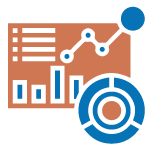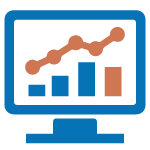
Why Do You Require Data Analytics & Reporting?
The richness of data generated by businesses includes significant insights, and data analytics is the key to unlocking them. Data analytics can assist a business with everything from tailoring a marketing pitch for a specific customer to recognising and reducing business risks. Data analytics can help organisations enhance operational efficiency. Data security issues affect all enterprises. By analysing and displaying relevant data, organisations can utilise data analytics to determine the reasons for previous data breaches.
In addition, IT departments can utilise statistical models to avoid future assaults. To get the greatest results from data analytics, an organisation should concentrate its data in a data warehouse for convenient access.
Increasing Business Efficiency Through The Services That We Render

Managing Data Analysis

Analytics as a Service (AaaS)

Data Analytics Consulting

Data Analytics Implementation

Data Analytics Modernisation

Data Management Services

Retrieve Information That Lives In Your Data That Helps Improve Your Company’s Bottom Line
If your organisation has expanded to the point that you want rapid, reliable, and actionable information, you should think about deploying a data analytics system. As a consequence, efficiency and performance improve, as does the capacity to depend less on gut instinct and more on actual statistics. Analytics will reveal information you need to enhance your company’s bottom line, whether you’re monitoring client purchasing behaviour, measuring the success of your sales staff, or controlling your stock movement.


OSIPL Prepares You For The Future By Unlocking The Power Of Your Data With The Latest Technologies, Speed & Agility.
Professional Team
Extensive Experience
Timely Delivery


Compelling Benefits Of Data Analytics & Reporting
Personalised Customer Experience
Businesses obtain customer data through a variety of sources. Businesses may get insights into their consumers' behaviours and plan and deliver a better and more personalised customer experience with the help of data analytics to generate full customer profiles from this data.
Informed Decision-Making
Data analytics can help businesses make better and well-informed business decisions and also limit their financial losses. Predictive analytics can predict what could happen in response to business changes, while prescriptive analytics can recommend how the business should respond to these changes.
Improved Operational Efficiency
Gathering and analysing data about the supply chain may reveal the source of production delays or bottlenecks, and help forecast where future issues might develop. Based on characteristics such as seasonality, holidays, and secular patterns, data analytics can help determine optimal supply for all of an enterprise's products.
Business Risks Mitigated
In business, there are risks everywhere. Customer or employee theft, uncollected receivables, employee safety, and legal responsibility are some of the common data risks that are faced by businesses. Data analytics can assist an organization in understanding the potential risks and taking preventative measures to avoid any setbacks.
Recovery From Setback
Data analytics can minimize losses following a business setback. If a company overestimates the demand for a product, data analytics can identify the best price for a clearance sale in order to minimise inventory. A business can even develop statistical models that will automatically give recommendations on how to fix recurring problems.
Enhanced Data Security
By analysing and visualising relevant data, organisations can apply data analytics to determine the reasons of previous data breaches. To discover the path and origins of an attack, the IT department can employ data analytics programmes to analyse, process, and display audit logs.
Set Up Full-Fledged Analytics & Reporting Solution with Expert Assistance
Build analytics and reporting that are reliable and transparent, removing the guesswork from your business processes and identifying new profit potential. Our analytics experts will be glad to provide professional advice to help you succeed in your business intelligence, big data, or data science efforts.




